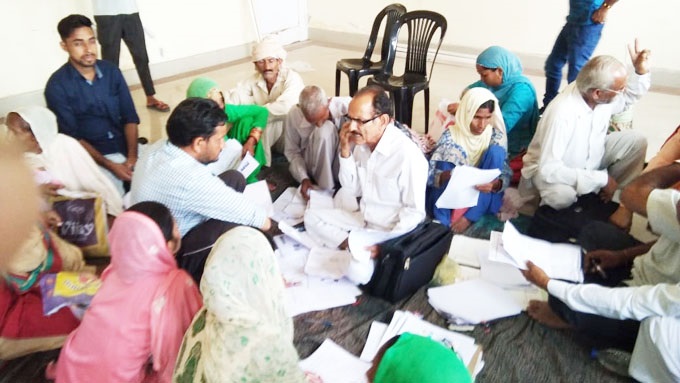| DAHWA calls on Tehsildar, takes up rural issues | | |  Early Times Report Early Times Report
JAMMU, Sept 19: In its endeavors to take stock of grievances of people living in rural pockets besides highlighting government schemes meant for rural emancipation, Destitute and Handicapped Welfare Association (DAHWA), convened monthly rural awareness cum pension camps at Khoon and Majalta in Udhampur district.
During the camps, Chairperson DAHWA, S.S. Sumbria had a detailed review of the new eligible pension cases besides old pending cases of widows, old aged and handicapped. The team scrutinized the pension documents of the beneficiaries and prepared a list of issues need to be taken up with the adminsteration for redressal.
Later, DAHWA team called on Tehsildar, Majalta, Malik and apprised him of the issues confronting the people of Majalta tehsil on account of basic services, revenue services, pensions etc.
The Tehsildar gave a patient hearing to the team and evinced keen interest in redressing the public issues and assured that he will plan holding of public darbars to assess public grievances for an early redressal.
Chairperson DAHWA, S.S.Sumbria, while assessing the problems and demands of people, assured that the association will take up all their issues with the concerned authorities and will take care that these are done at the earliest by pursuing the same at all levels.
The camps were attended by people from various villages of Majalta tehsil including Palnoo, khoon, Jakhenoo, Sundla, Babey, Garh Panjia, Badigarh, Sail, Katheel, Satrari, Manwal, Thalora, Mansar, Kakrai, Chor Motu, Ghar Samnabhanjj etc
The DAHWA team was comprised of Om Parkash, P.C.Basotra, Subhash Chander, Geeta Devi, Naseem Begum, Chanchla Devi, Raj Begum, Anju Begum, Kanchan Devi.
Pertinently, DAHWA holds four such camps in these areas every month and support the poor people of hilly and rural parts in getting their issues sorted out with the help of concerned departments. The objective of such initiatives is to provide a platform to common masses interact with local administration for redressal of their grievances mainly related to basic amenities besides creating awareness among people of these areas about the schemes of the government meant for their social, economic, cultural and political emancipation |
|
